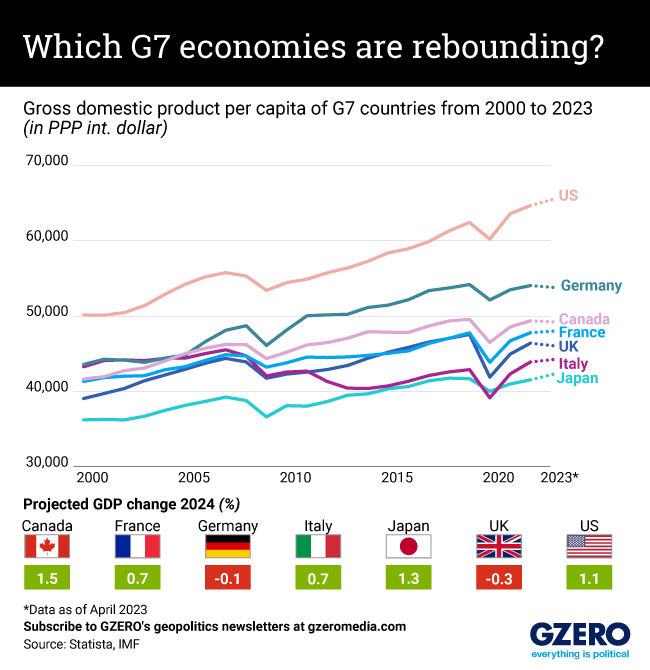June 22, 2023
G7 nations – the US, UK, Germany, France, Italy, Japan, and Canada – are among the wealthiest economies in the world, but that doesn’t mean they have been insulated from economic disruptions over the past two decades.
When it comes to GDP per capita – which reflects a country’s economic performance relative to its population size and levels of productivity – the US rises well above other G7 states. This is largely because the US economy is more dynamic and more open to risk. Consider that the US has the most unicorn startups in the world – and by a long shot. It has also sought to revitalize cities in the South and West, giving a further boost to overall productivity. This breadth also makes the US economy more resilient, helping it recover faster when economic downturns – caused by a pandemic and war in Europe – ripple through the global economy.
When it comes to overall economic growth, however, Canada is expected to come in first place in 2024, in part due to a strong labor market that recovered quickly post-pandemic.
We look at how GDP per capita among G7 nations has changed since the turn of the century and give a snapshot of projected growth in these countries in 2024.
More For You
Bad Bunny during the Super Bowl LX halftime show press conference at Moscone Center.
Kirby Lee-Imagn Images
100 million: The number of people expected to watch the Super Bowl halftime performance with Bad Bunny, the Puerto Rican superstar and newly minted Album of the Year winner at the Grammys.
Most Popular
Think you know what's going on around the world? Here's your chance to prove it.
- YouTube
An imminent US airstrike on iran is not only possible, it's probable.
Americans are moving less — and renting more. Cooling migration and rising vacancy rates, especially across the Sunbelt, have flattened rent growth and given renters new leverage. For many lower-income households, that relief is beginning to show up in discretionary spending. Explore what's changing in US housing by subscribing to Bank of America Institute.
© 2025 GZERO Media. All Rights Reserved | A Eurasia Group media company.
